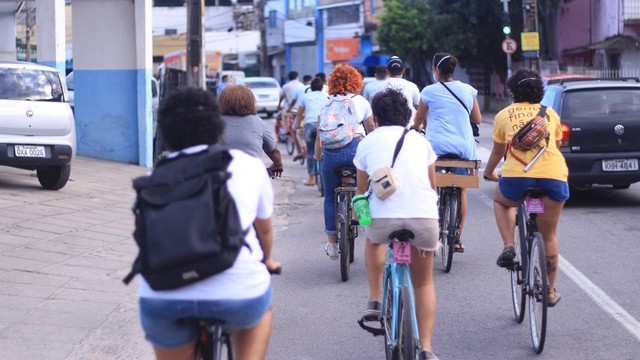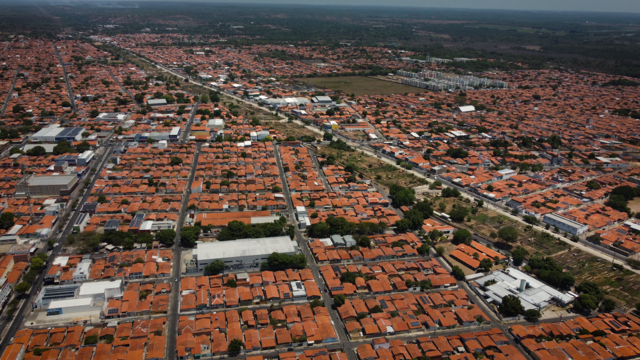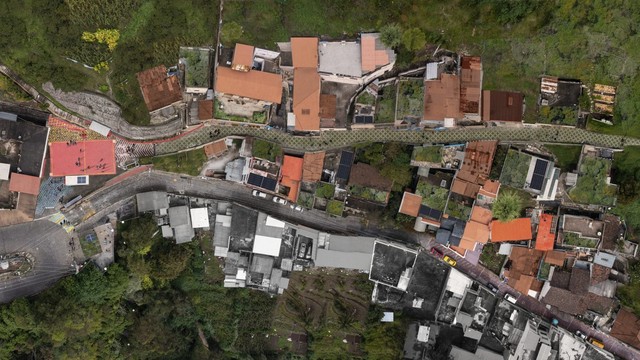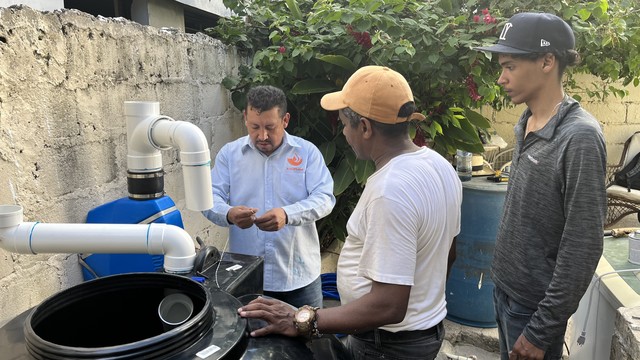Cuenca: recycling and decarbonisation through a gender lens
Using a participatory approach and based on circular economy principles, the RUMBOS project is empowering women recyclers in Cuenca, Ecuador, to achieve better working conditions and incomes, while reducing waste and decarbonising the city.

Annual march for Recycling Day, 2023 (Photo: copyright RUMBOS project, University of Cuenca)
For the last 30 years, recycling has been an essential activity in the city of Cuenca, Ecuador. The work is vital for the subsistence of those engaged in it, the majority of whom are women. After years of organising and campaigning, in 2008 recycling groups in Cuenca set up Ecuador’s National Recyclers Network RENAREC (in Spanish), which currently brings together more than 50 associations from all over the country (in Spanish).
Over time, the structure of the recycling workers’ organisations has been influenced by various actors, both public and private, who have provided support with training, political participation and equipment.
Cuenca is known as a regional leader in waste management. Cuenca’s Municipal Waste Management Enterprise (EMAC.EP) has published good practice manuals and is known for its innovative management of the Pichacay Landfill Site.
The city also passed a local law that regulates and recognises the work of the recyclers and set up the Inclusive Recycling Fund, which pays them US$21 per tonne of recyclable materials collected. This acknowledges that the work done by the recyclers saves the city money, as well as extending the useful life of the landfill site.
Since 2019, this fund has been reinvested to strengthen the recyclers’ organisations, and their work led to the passing of the law on the circular economy.
Despite these institutional advances, recycling in Cuenca continues to be carried out under difficult and dangerous conditions, and mainly by women working alone. In response to this, the RUMBOS project, which is led by an interdisciplinary team from Cuenca University, aims to implement transformative strategies that will improve the recyclers’ working conditions and raise the occupation’s status by 2024, using a gender, intersectional and community-based approach.
Bertha Chalco, association presidentWe had to fight really hard, every single day, to achieve the goals we’d set ourselves. We give thanks to God that we have achieved those goals, but we don’t want to stop there, we want to keep achieving more and more of what we set out to do

Collecting waste for recycling in the street (Photo: copyright RUMBOS project, University of Cuenca)
Strengthening recyclers’ organisations as a decarbonisation strategy
Throughout 2022 recyclers made a major contribution to decarbonisation and climate change mitigation. They reported a total of 1,285.22 tonnes of materials recycled – a significant contribution to reducing carbon emissions. Of these materials, 51% was paper and card, 25.08% was plastic, 12.12% glass and 11.28% metal.
These efforts have resulted in the recycled materials effectively replacing virgin raw materials, thus avoiding emissions amounting to 7,519.117 tonnes of CO2e, including emissions of CH4 caused by the rotting of paper and card in landfill sites. These figures were calculated using the method proposed by Burneo et al.
According to the Environmental Protection Agency (in Spanish), this impact is equivalent to using 15,777 barrels of oil or 767,539 gallons of gasoline.
As well as having a positive environmental impact, these initiatives have also generated significant savings in the landfill site’s operating costs. The recyclers are estimated to have saved the public purse a total of $26,989.62 (in Spanish) in operating costs avoided per tonne of recycled material not sent to landfill, compared with the $21 per tonne paid by the Inclusive Recycling Fund, without taking into account the costs of transport and refuse collection staff.
These figures are based on the amount of recycled materials reported by 142 of the 276 recyclers registered by EMAC.EP in 2022. However, it is important to recognise that the number of recyclers is not limited to those who are members of formal organisations. Many recyclers work independently and are not members of the organisations, but there is little information about them.
In this context it is worth highlighting that the Inclusive Circular Economy Law (in Spanish), passed in 2021, recognises the occupation of grassroots recycler and stipulates that the state must acknowledge and value the work they do as part of the integrated management of solid waste.
It also states that the autonomous decentralised governments should promote the grassroots recyclers’ organisations by providing support in the form of technical assistance and legal advice, issuing identity cards, and providing them with personal protective equipment. However, due to the lack of access to technology, the absence of procedures and records of incoming and outgoing materials, and the recyclers’ reluctance to deliver the materials they collect due to mistrust, it is safe to say that the quantities reported are much lower than the actual amounts collected.
According to figures from RUMBOS, the amount collected by each recycler is one tonne per month, and this corresponds with the national data published by the Regional Initiative for Inclusive Recycling (in Spanish).

Categorising waste at El Chorro Association’s collection centre (Photo: copyright RUMBOS project, University of Cuenca)
The impact of climate change on the recyclers has been documented at the regional level. A study carried out by WIEGO found that recyclers in Brazil are affected by heavy rain, floods and droughts, which reduces the quantity of material recycled and has a direct impact on their work. Climate change also affects the recyclers’ health, increasing the likelihood fainting, dehydration and sunburn. This situation particularly affects women recyclers, according to a report by Circular Action Hub.
The difficult socio-economic conditions faced by the recyclers in Cuenca have been amply documented. A study analysing the life-cycle of the recycling system (in Spanish) conducted in 2021 by the University of Cuenca, showed that the people who carry out this important work face significant challenges related to quality of life and wellbeing.
Other obstacles affecting the sector include limited access to technology, the absence of technical and administrative procedures for keeping an inventory of the materials collected and sold, and the recyclers’ reluctance to report the amount of materials they collect due to distrust.
The process to strengthen the recyclers’ organisational structures involves providing access to technologies and increasing knowledge of how to use them, participatory development of public policies that recognise and strengthen recycling as an occupation, and providing training on citizens’ shared responsibility.
These processes will have a direct impact on the recognition and effectiveness of workers’ rights, raising the status of recycling work and reporting the quantities of recyclable materials collected more accurately, demonstrating the significant contribution of this work to decarbonisation.
Public policy strategies
According to the information gathered by the RUMBOS project, 77.7% of those engaged in recycling in the Cuenca canton are women. Ten of the 11 associations of recyclers are also led by women. The data reveal the vulnerable conditions in which the recyclers live, due to structural poverty.
The 2034 RUMBOS survey found that recyclers earn an average of $160 per month from their work. But the average income for women is $130.9 whereas for men it is $187.6 – a gender gap of $56.7. In addition to their recycling work, women are also responsible for care work in the home, and they tend to devote two more hours a day to this unpaid work than their male peers. As a result, households headed by women recyclers have lower incomes than those headed by men, with a gender gap of $21.1.
In response to this situation, the RUMBOS project has approached key actors interested in improving the living conditions of the people who work in recycling, including public and private institutions, NGOs and recyclers’ organisations.
Through participatory co-design methodologies with the allied stakeholders, public policy initiatives that would lead to changes in structural conditions have been proposed, together with specific actions such as training and education for recyclers. In 2023 and 2024, the RUMBOS project therefore plans to implement training in soft skills, leadership, gender and working as part of an association.
It also proposes a space for the different actors in the ecosystem to coordinate through the Cuenca Canton working group on recycling, which is a forum for policy advocacy coordinated by the recyclers. As of December 2023, at least 20 institutions were involved in the group, and it has defined an action plan for 2024.
Likewise, a gender approach was mainstreamed into the development of this proposal, and specific strategies have been designed to include women recyclers in a meaningful way in the participation and decision-making spaces, as well as the training activities and the working group. Accordingly, a quota of 80% women and 20% men has been established for the training activities. This involves affirmative action to ensure that the majority of the recycling population is represented in the training events.
The action that has probably had the biggest impact on effective inclusion is the provision of daycare. With the support of partners such as Fundación Alianza en el Desarrollo (FAD), physical spaces have been provided for the children and other dependents of the women recyclers.
These facilities have toys and learning resources and are staffed by expert caregivers who look after the children and other dependants while the recyclers attend meetings and workshops. This initiative has been welcomed by the women recyclers, who can now rely on allies to take care of their dependants while they participate in these activities.
Productivity strategy with an inclusive recycling approach
Aimed at increasing productivity, the project plans to accompany a group of recyclers to meet with the management of a recycling company, in a collaborative approach in line with the concept of the inclusive circular economy.
The strategy aims to empower the recyclers themselves and strengthen their role in the value chain, as well as improving relations with waste producers in industry by providing them with services such as waste recycling. By cutting out intermediaries, the idea is to strengthen cooperation and promote direct negotiation between agents in the value chain, to achieve a significant change in waste management and the inclusion of the recyclers based on fair conditions. This strategy was developed with the recyclers and validated by them before being implemented.
First, problems related to organisation and production were identified, and solutions were developed together with the recyclers. The strategies were then prioritised depending on how urgent and viable they were, thus ensuring they were aligned with the recyclers’ needs and wishes. After this, implementation began. Its second stage focuses on motivating, training and empowering the recyclers.
The aim here is to foster the development of business ideas for inclusive recycling and promote active participation by the recyclers in strengthening the cooperative. An event called the "Ideas Recyclathon" was held to present and choose the best proposals, and a ‘transformation’ group of committed recyclers was formed to lead their implementation.

Posters outlining the work with the recyclers in Cuenca from 2023-24 (Photo: copyright RUMBOS project, University of Cuenca)
The third stage consists of establishing a services cooperative with a governance model. The transformation group will be supported throughout the process of setting up the cooperative, from organising the incorporation assembly to drafting the bylaws and regulations and legally registering the cooperative with the relevant authorities. This will enable the cooperative to operate smoothly and comply with the established regulations.
The final stage focuses on implementing and evaluating the management model. A strategic planning exercise will be conducted to decide how to implement the selected business ideas, the results will be monitored and evaluated continuously, and the sale of the cooperative’s products and services will be promoted in the local and regional market.
The objective of this proposal was to improve the recyclers’ working conditions and income and reduce environmental pollution, in line with the principles of the circular economy (Spanish). By strengthening the cooperative and promoting the active participation of the recyclers, it aims to ensure that the benefits reach the people directly engaged in recycling work. This will help to mitigate environmental impacts as well as addressing the issue of social justice by recognising the recyclers’ rights as workers. It is essential to follow a participatory and collaborative approach at every stage so that the recyclers themselves remain committed to the project and ensure its sustainability once the process has been completed.
Looking ahead
One key objective of the RUMBOS project is to ensure that local institutions and other stakeholders, together with the recyclers themselves, have an agreed public policy agenda that is maintained over time.
With the support of the Public Policy Subgroup in the Cuenca Canton Working Group on Recycling, the RUMBOS project hopes to raise the profile of a group of recyclers with leadership skills and the ability to influence decision making in local and national government, from a critical perspective and in a way that genuinely includes the women recyclers.
In the area of production, the aim is to develop a community-based productive model that can be incorporated into the recycling system value chain and increase recycling rates, as well as providing economic benefits for the recyclers themselves.
The overarching goal of both the policy- and production-oriented actions is to raise the status of the work done by those engaged in recycling in Cuenca and contribute to decarbonisation and climate change mitigation at the local level, with a global impact.
Further reading
- Contributing to the Circular Economy through Inclusive Recycling
- Guía del análisis de ciclo de vida social del sistema de reciclaje de cuenca (PDF, in Spanish)
- Supporting women in the informal waste sector
- Waste pickers on the global stage fighting climate change
- Environmental and socioeconomic impacts of urban waste recycling as part of the circular economy. The case of Cuenca (Ecuador)
- From climate research to climate action: climate change mapping of impacts on Brazilian waste pickers, blog (2023)
- Statistical information on environmental economic data in autonomous decentralised municipal governments 2021 of Ecuador (in Spanish), (2021)
- Organic Law of Inclusive Circular Economy of Ecuador, (2021)
- Reciclaje inclusivo y recicladores de base en el Ecuador (PDF, in Spanish), report (2015)
Authors

Damián Burneo Sotomayor is an engineer specialising in economics and development and environmental engineering from the University of Seville. He is a researcher in the Inclusive Circular Economy and Sustainable Development Group, and coordinator of the organisational and productive strengthening component within the RUMBOS project, University of Cuenca

Paola Pila Guzmán is coordinator of the public policy component and gender expert in the RUMBOS project at the University of Cuenca, and coordinator of the gender and care research component of PYDLOS, University of Cuenca. She holds a PhD in philosophy specialising in political science from the UANL, Mexico. Her areas of research include gender and development, gender and public policy, and gender and territory.

Erika Rea Rubio is a graduate in visual arts from the University of Cuencam and a student of gender and development at the University of Cuenca. She is also a research assistant in the public policy component of the RUMBOS project.
Frontrunner cities forms part of the Transformative Urban Coalitions (TUC) project, funded by Germany's Federal Ministry of Economic Affairs and Climate Action



